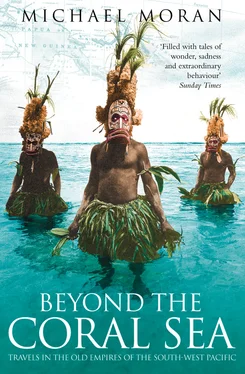The area toward East Cape is relatively unspoilt, and we passed the immaculate hamlets, villages and family communities of the Tavara people that have been erected at the very edge of the water. Clear, swept areas of sand have been carved from the dense tropical jungle to accommodate the thatched-roof huts erected on stilts with diapered walls of palm leaf. Smaller detached huts nearby serve as kitchens. Bedding of patterned sleeping mats and pillows was laid out in the sun to air. A Milne Bay woman stood at the window waving and smiling through the brightly coloured washing hanging on the line. Beautiful children squealed with intense pleasure as the family pig blundered about the yard accompanied by a wretched dog with its scrawny pups. The road caused us to be thrown about inside the cabin like rag dolls.
‘Where were you born, Sele?’ I asked. The girls craned forward, bumping my shoulder and listening intensely to my words, collapsing in fits of giggles if I caught their eye.
‘On Logea Island, near Samarai.’
‘Really? I hope to go there. I want to visit the Kwato Mission.’ Coincidentally, we were passing a church, one of many along this road. Pale blue walls with a simple black cross. As it was Sunday, a large congregation had filled the building. The huge windows were thrown open and hymns were being sung with a passionate enthusiasm that saturated the tropical groves.
‘They are good people!’
Sele had a stained ivory smile and seemed illuminated from within by his Christianity. A good man. The girls had never been to East Cape before and were in a state of high excitement, chattering and giggling interminably.
‘Are you still at school, Rachel?’ I glanced over my shoulder at the pair bouncing in the back.
‘No!’ they chorused, ‘ Mipela iwok lon Lodge, insait lon kisen. ’ 1 Few children go on to secondary school. We bumped along, the springs often bottoming out in the potholes.
‘Is there much violence around Milne Bay, Sele?’
‘No. It’s peaceful here. A ship came in from Lae with many raskols last month. It was in the harbour. Many crimes happened but we got rid of it pretty quick. We don’t want such things here in Alotau.’
He seemed proud of taking the moral high ground and clearly wanted me to judge Milne Bay and the islands as far superior to the rest of the country.
Picturesque family groups were sitting on the beach in the shade of flowering pink and white frangipani trees, talking, laughing and looking out to sea. Many elegant canoes with outriggers were drawn up on the shore under rosewoods. The hulls had faded to a delicate pale blue or jade green. Groups of children happily played with models fitted with sails. These childish replicas were to be the only sails I saw whilst in Papua New Guinea.
The puncture we got from the brutal coral road was only to be expected. Sele showed not the slightest exasperation, treating it more as a slight inconvenience than a drama. The spare wheel was loosely chained to the vehicle and the change was accomplished in record time. The girls were extremely helpful, as I attempted to be, but the humidity and the searing sun made physical effort an exhausting task for a dimdim. 1
This road had been a quagmire in 1942 when the airbase at Gili Gili was being hewn out of the jungle to defend Milne Bay against a landing by Japanese Marines. The local people had watched spellbound as gelignite was placed in holes drilled in the base of coconut palms and the detonation propelled them vertically into the air. Our situation reminded me of photographs I had seen of bogged trucks and ruptured tanks that had skidded into ditches during the battle.
During the Second World War, Milne Bay possessed great strategic significance as it guarded the sea lanes to Australia and the eastern approaches to Port Moresby. By mid-1942, the area had become enormously important to General MacArthur in his campaign against the seemingly invincible Japanese. The Imperial Army had conquered the Bismarck Archipelago and was poised to strike at Australia. Pearl Harbor, Singapore, Malaya, the Philippines and the Dutch East Indies had already been consumed by the forces of the Rising Sun. A remarkable victory was achieved here by the Australians and the Americans against malaria, typhus, bombs, scorpions, mosquitoes, rats, falling coconuts, crawling insects, green dye bleeding from their uniforms, disease, forbidding terrain, incessant rain, clinging mud and a fanatical enemy. This largely forgotten battle marked the extraordinary first defeat of the Japanese on land and halted any further advance in the Pacific, west or south.
The local villagers played a significant role in the victory and suffered terribly at the hands of the Japanese. Many village men were tied to coconut palms with signal wire and bayoneted in the chest or anus. A girl of fourteen was staked out, stripped naked, a bamboo stake driven through her chest, her breasts cut off and placed on the ground beside her. Poor food supplies meant the Japanese even turned to cannibalism. Australians took their own violent turn, and carried out summary executions of villagers they suspected of collaboration. For the local people it was a foreign war of which they understood nothing and cared less. Despite the atrocities, their loyal support of the Australians led to them being known as the ‘fuzzy wuzzy angels’.
The perpetration of unspeakable tortures by the Japanese has an explanation of sorts. The private in the Japanese army was treated as a cipher by his officers; animals and weapons were treated better. They became intoxicated in the heat of battle and disregarded discipline. Brutalised soldiers may have been effective against Russian, Chinese or Manchu troops, but permitting emotion to dominate proved fatal in the Pacific War. In the jungle they suffered from malaria, fatigue, poor food and heavy, outdated equipment. A private had no method of relieving the pressure of his pent-up fury. Japanese officers intended their men to hate them. The officer class was driven by elitism and a sense of fanatical loyalty to the Emperor and his Imperial Army. When unsheathing the sacred regimental sword, an officer would bind his mouth with cloth to avoid breathing upon it and as a war journal observes, ‘amorously caress the naked blade with white silk’.
‘On the way back I’ll show you where the Japanese landed,’ Sele said. ‘Local people told their spies the wrong place!’
The sudden silence that followed once the truck had stopped wrapped us in a cloak of birdsong, the laughter of children, tiny waves rapidly lapping on the shore and cicadas racketing in the tropical heat. War seemed a distant memory and little appeared to have changed for millennia. Milne Bay is one of the least disturbed areas in the whole country.
East Cape has glaring white coral beaches, a decaying schooner hauled up under the palms and a granite Methodist Mission Memorial baking in the sun. The small village of Bilubilu is nearby. Across the Goschen Strait the looming bulk of Normanby Island seemed to deserve its reputation for sorcery and cannibalism. Sele and the girls unpacked our lunch and I sat with my back against a gnarled tree at the edge of the turquoise sea and ate my sandwich, watched carefully by a group of shy children who put their fingers in their mouths and tugged at their clothes.
The cobalt waters that swirl up between the vastness of the Coral and Solomon Seas are diamond clear and support an unparalleled profusion of marine life. Many forms are still to be classified by biologists. The reef drop-off is perfect for snorkelling. More screams of laughter as I climbed into my diving gear – lycra suit, gloves, booties, fins, mask and snorkel. Coral cuts become infected in seconds in these warm waters, so rich are they in bacteria. There are the added attractions of fire coral that cause long blisters when touched, lionfish with beautiful but treacherous spines, cone shells that shoot poisonous darts, stinging hydroids, the occasional shark. I was taking no chances. Children swim constantly with no protection but I never saw an adult Melanesian swimming for pleasure.
Читать дальше












